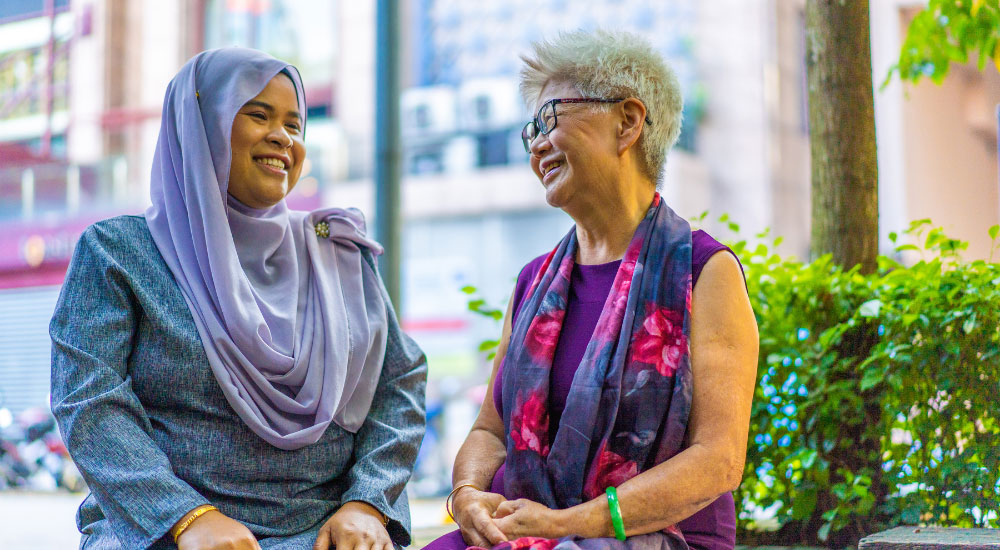World Cities Summit 2024
Ageing Alone: Examining Social Isolation in Older Adults

Overview
Singapore is facing a greying population, with a growing trend of seniors living alone. This is worrying as social isolation has a serious impact on a person’s physical and social wellbeing.
About 6% of older adults in Singapore are socially disconnected, and 4 in 5 older adults feel socially isolated despite living with their families*.
SMU’s Centre for Research on Successful Ageing (ROSA) studied the likely causes of social isolation with two goals: to better understand holistic wellbeing for older adults, and to translate the findings into policy implications that can promote successful ageing among Singaporeans.
Social isolation and loneliness are different, and the study makes this distinction, which may help to identify suitable interventions.
Methodology
Since 2015, ROSA has been hosting the Singapore Life Panel, a high-frequency longitudinal panel that surveys Singaporeans aged between 54 to 79. The research team uses the anonymised data to study emerging trends to contribute to the larger discourse on older adult wellbeing.
For the study on social isolation, ROSA included 8,013 participants, with the average age being 64 years old.

Profile of the participants in the study.
ROSA has previously validated almost 20 variables of wellbeing through the Singapore Life Panel . It extracted these variables to examine the inter-relationships between them and their relationship with social isolation. This is a crucial step towards having a better understanding of social isolation relevant to policy developments. ROSA seeks to understand the stressors and resources that contribute to wellbeing in Singapore’s population of older adults.

The study looks into a range of economic, physical, mental, and social wellbeing
variables.
The data collected by ROSA is used to produce a model that can capture the complexity and nuances of likely determinants of social isolation. This model serves as a reference for researchers and policymakers.

A simplified version of the model showing the potential determinants of social
isolation.
Findings
Perceived Helpfulness and Perceived Social Isolation
The study found an inferred causal relationship between perceived helpfulness and perceived social isolation among older adults in Singapore. This implies that hypothetically increasing feelings of helpfulness would likely cause reduced perceptions of social isolation.
Sense of Meaning in Life Likely Associated with Perceived Helpfulness
The study also found that having a sense of meaning or purpose may contribute to feelings of helpfulness, and this in turn could contribute to lower social isolation. Moreover, good physical health is likely to contribute to their sense of meaning and perceived helpfulness, which in turn could contribute to lower social isolation.
Implications
Promote Helpfulness through Meaningful Programmes
A policy strategy could involve promoting helpfulness through diverse programmes like encouraging voluntary work or helping older adults embrace practices that hold personal meaning to them. Policymakers need to ensure that these programmes are perceived as meaningful and substantive rather than exploitative or superficial. The latter could negatively impact older adults’ sense of purpose and meaning, which may diminish their sense of helpfulness.
Promote Physical Health as a Pathway
The programmes could align with health campaigns to convey the message that older adults should prioritise not only their physical wellbeing but also actively engage in helpful behaviours for others. Policymakers could consider health as a pathway that leads to a greater sense of helpfulness, which may reduce social isolation.
*Source: Elderly people may feel lonely, isolated even while living with family: Study. (2021, August). Straits Times. Retrieved April 26, 2024, from https://www.straitstimes.com/singapore/elderly-experience-social-disconnection-even-among-those-living-with-their-family-study The problem with being alone: Social isolation, loneliness biggest enemy for seniors in S’pore. (2023, December). Straits Times. Retrieved April 26, 2024, from https://www.straitstimes.com/singapore/all-the-lonely-people-tackling-social-isolation-among-older-singaporeans

Lead Researcher:
Paulin Tay Straughan
Professor of Sociology, SMU School of Social Sciences;
Director, Centre for Research on Successful Ageing;
Urban Fellow, SMU Urban Institute
Funding organisation: The Ngee Ann Kongsi and the Ministry of Education, Singapore
Read more about this study: A causal discovery exploration of determinants of social isolation
